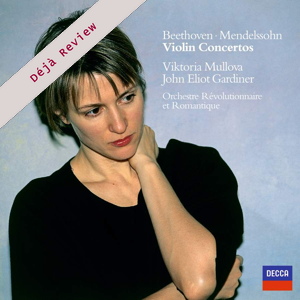
Déjà Review: this review was first published in November 2003 and the recording is still available.
Ludwig van Beethoven (1770-1827)
Violin Concerto in D major, Op.61 (1806)
Felix Mendelssohn (1809-1847)
Violin Concerto in E minor, Op.64 (1844)
Viktoria Mullova (violin)
Orchestre Révolutionnaire et Romantique/John Eliot Gardiner
rec. 2002, Watford Colosseum, UK
Presto CD
Philips 4738722 [68]
This disc seems to have fairly and squarely divided critical opinion, and it’s easy to see (or hear) why. For a start, almost every lover of classical music will have at least one (or possibly many) favourite versions of these much-loved masterpieces. This does tend to set up a certain bias, whether conscious or not, and makes any new version, especially one with ‘historically aware’ practices in mind, have a disadvantage from the start.
Actually, neither of these new concerto recordings has what might be anticipated as the expected ‘problems’; tempos are pretty straight, even relaxed in outer movements, and while slow movements move on, they never undermine the lyricism or character. I fully expected a much brisker speed in the first movements of both concertos, and whilst they are not sluggish, they are certainly not controversial. What they do possess is a marvellous inner energy. One recognises straightaway the traits that make Gardiner’s interpretations difficult to ignore; exceptional rhythmic vitality, attention to woodwind lines and a real feeling of discovery, making the music come up fresh as new paint.
In this he is helped, of course, by a soloist who shares his convictions. Mullova has been accused of being too cool in the past, but that very refusal to romanticise (or sentimentalise, particularly in the Mendelssohn) suits Gardiner’s approach completely, and her crystal clear, gut-stringed instrument provides the perfect complement to the period band.
What the opening of the Beethoven may lack in the last ounce of mystery is more than compensated for with a blend of urgency and cleanly shaped lyricism. It may well be that the lack of vibrato on the wind and strings, as well as the leather and stick drums, bothers some, but there is no doubting the strength of the line and the clarity of the harmonic argument. Anyone who knows Gardiner’s Beethoven symphony cycle will know what to expect; wonderfully explosive tuttis, very tightly controlled ensemble work and those marvellous period woodwind and brass piercing the string texture and making you sit up and notice lines you never heard before. This is period Beethoven at its best. The pulse is rock steady, with the ‘ma non troppo’ marking clearly influencing speeds. Mullova’s intonation and tone are spot-on, as is her virtuosity, and the partnership is very much on the same wavelength.
The larghetto sings its song in the same unfussy, direct manner, though here some listeners may hanker for their old favourites. I did a quick comparison with one of my current front runners (Hilary Hahn with Zinman and the Baltimore S.O.) and found that their tiny degree of give-and-take did pay dividends, though Mullova and Gardiner’s sheer intensity and rapt concentration are mightily effective. The finale is again not too quick but carries the same degree of tautness and sprung rhythmic force that the music requires. New cadenzas by Ottavio Dantone are okay but do little to advance our understanding of the piece, and are certainly no better than the Kreisler cadenzas used by Hahn and others.
The Mendelssohn is an even finer performance. Once again one is brought up short by the quite measured speeds, but both musicians really take note of the composer’s first movement marking of ‘molto appassionato’. Mendelssohn’s beautifully crafted orchestration really glitters with period instruments and time and again I noted passages that simply came alive in their hands. The lead into the famous andante is superbly handled, with even the tiniest hairpin dynamics observed. Textual differences are more apparent in this piece than the Beethoven but don’t amount to anything too radical, the odd grace noted ironed out, some ornamentation altered etc. The finale proper is not quite as fast as Hahn and Zinman but has a rhythmic buoyancy that is wholly captivating.
This strikes me as the sort of disc that will irritate as many as it will thrill. I definitely fall into the latter camp, as I love having the cobwebs blown off familiar works, and like to be challenged as a listener. The recording quality is superb, full and warm. Excellent notes are by Richard Wigmore. Anyone not already won over by period practice should try before they buy, but Gardiner fans will need no persuading.
Tony Haywood
Help us financially by purchasing from



















